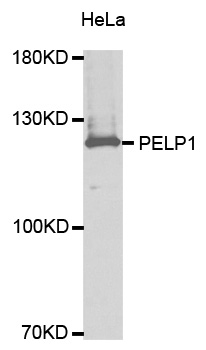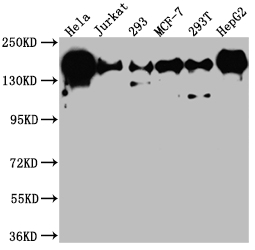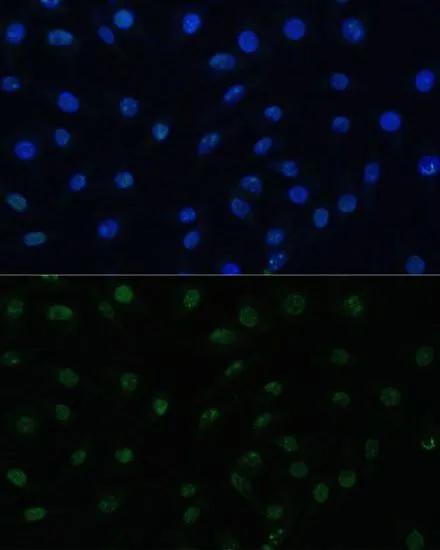![Various whole cell extracts (30 μg) were separated by 7.5% SDS-PAGE, and the membrane was blotted with PELP1 antibody [GT1339] (GTX03251) diluted at 1:1000. The HRP-conjugated anti-rabbit IgG antibody (GTX213110-01) was used to detect the primary antibody. Various whole cell extracts (30 μg) were separated by 7.5% SDS-PAGE, and the membrane was blotted with PELP1 antibody [GT1339] (GTX03251) diluted at 1:1000. The HRP-conjugated anti-rabbit IgG antibody (GTX213110-01) was used to detect the primary antibody.](https://www.genetex.com/upload/website/prouct_img/normal/GTX03251/GTX03251_4000001387_20210709_WB_2_w_23053123_883.webp)
Various whole cell extracts (30 μg) were separated by 7.5% SDS-PAGE, and the membrane was blotted with PELP1 antibody [GT1339] (GTX03251) diluted at 1:1000. The HRP-conjugated anti-rabbit IgG antibody (GTX213110-01) was used to detect the primary antibody.
PELP1 antibody [GT1339]
GTX03251
ApplicationsWestern Blot
Product group Antibodies
ReactivityHuman, Mouse, Rat
TargetPELP1
Overview
- SupplierGeneTex
- Product NamePELP1 antibody [GT1339]
- Delivery Days Customer9
- Application Supplier NoteWB: 1:500 - 1:2000. *Optimal dilutions/concentrations should be determined by the researcher.Not tested in other applications.
- ApplicationsWestern Blot
- CertificationResearch Use Only
- ClonalityMonoclonal
- Clone IDGT1339
- Concentration1.65 mg/ml
- ConjugateUnconjugated
- Gene ID27043
- Target namePELP1
- Target descriptionproline, glutamate and leucine rich protein 1
- Target synonymsMNAR, P160, proline-, glutamic acid- and leucine-rich protein 1, modulator of non-genomic activity of estrogen receptor, proline and glutamic acid rich nuclear protein, transcription factor HMX3
- HostRabbit
- IsotypeIgG
- Protein IDQ8IZL8
- Protein NameProline-, glutamic acid- and leucine-rich protein 1
- Scientific DescriptionThis gene encodes a transcription factor which coactivates transcription of estrogen receptor responsive genes and corepresses genes activated by other hormone receptors or sequence-specific transcription factors. Expression of this gene is regulated by both members of the estrogen receptor family. This gene may be involved in the progression of several types of cancer. Alternative splicing results in multiple transcript variants. [provided by RefSeq, May 2013]
- ReactivityHuman, Mouse, Rat
- Storage Instruction-20°C or -80°C,2°C to 8°C
- UNSPSC41116161

![Various whole cell extracts (30 μg) were separated by 7.5% SDS-PAGE, and the membrane was blotted with PELP1 antibody [GT1339] (GTX03251) diluted at 1:1000. The HRP-conjugated anti-rabbit IgG antibody (GTX213110-01) was used to detect the primary antibody. Various whole cell extracts (30 μg) were separated by 7.5% SDS-PAGE, and the membrane was blotted with PELP1 antibody [GT1339] (GTX03251) diluted at 1:1000. The HRP-conjugated anti-rabbit IgG antibody (GTX213110-01) was used to detect the primary antibody.](https://www.genetex.com/upload/website/prouct_img/normal/GTX03251/GTX03251_4000001387_20210709_WB_w_23053123_564.webp)
![WB analysis of various samples using GTX03251 PELP1 antibody [GT1339]. Dilution : 1:1000 Loading : 25μg per lane WB analysis of various samples using GTX03251 PELP1 antibody [GT1339]. Dilution : 1:1000 Loading : 25μg per lane](https://www.genetex.com/upload/website/prouct_img/normal/GTX03251/GTX03251_50_WB_w_23053123_449.webp)
![WB analysis of rat testis tissue lysate using GTX03251 PELP1 antibody [GT1339]. Dilution : 1:1000 Loading : 25μg per lane WB analysis of rat testis tissue lysate using GTX03251 PELP1 antibody [GT1339]. Dilution : 1:1000 Loading : 25μg per lane](https://www.genetex.com/upload/website/prouct_img/normal/GTX03251/GTX03251_51_WB_w_23053123_256.webp)







![IHC-P analysis of mouse kidney tissue using GTX00668 PELP1 antibody [COD-16]. Antigen retrieval : Heat mediated antigen retrieval was performed in citrate buffer (pH6, epitope retrieval solution) for 20 mins Dilution : 1 μg/mL](https://www.genetex.com/upload/website/prouct_img/normal/GTX00668/GTX00668_20191002_IHC-P_55_w_23053121_470.webp)